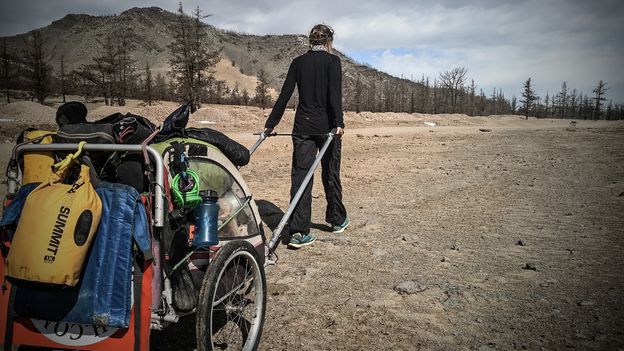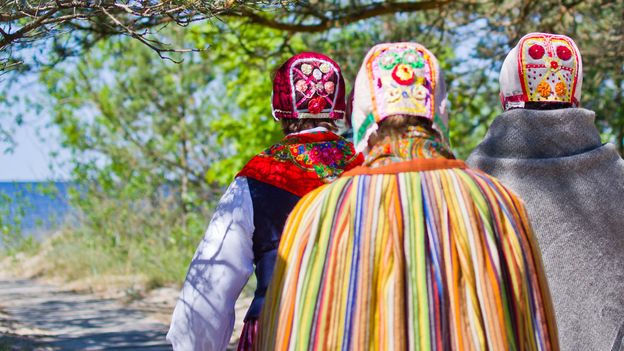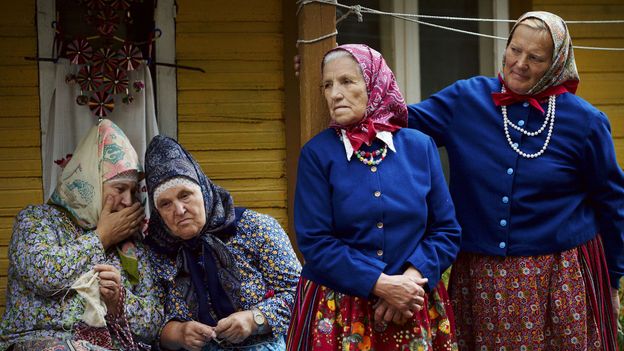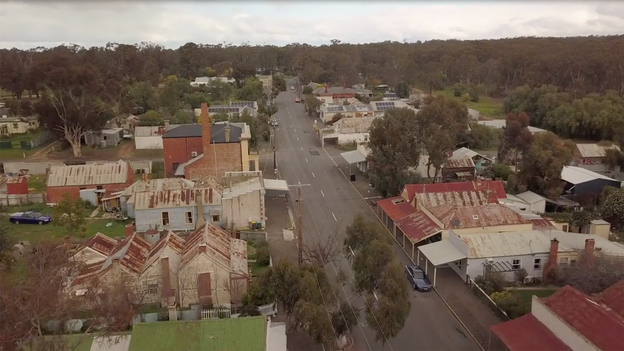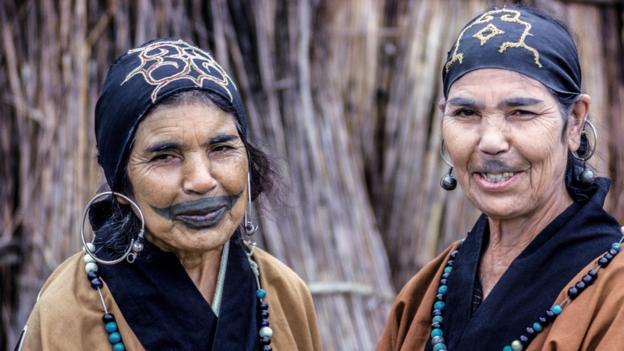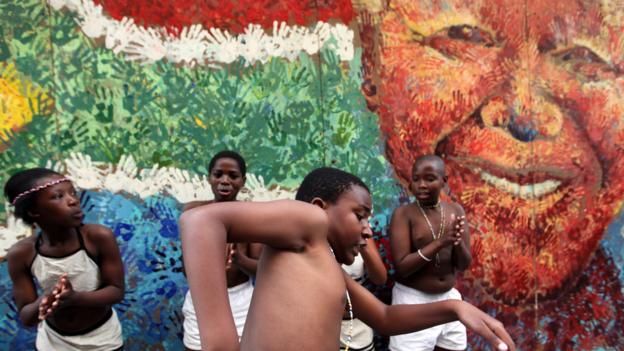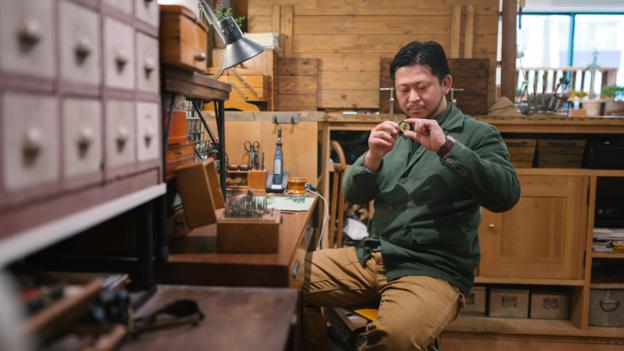A dozen or so young men wait, some playing cards or chatting around a fire. It’s a scene from any street in Niger over the past three decades. One, the “tea man”, attends a small metal kettle on hot coals. He is responsible for the long and laborious process of brewing his group’s, or fada’s, gunpowder green tea. It’s the reason they have gathered.
The men give their fada a name, which they often paint on the wall by which they gather along with murals of tea pots. The names they choose to call themselves can speak of the hopes and aspirations the men have for their futures. Names like “Money Kash”, “Lune de Miel” [Honeymoon] or “Brooklyn Boys”. Others hype up their members (“Top Star Boys”) or reiterate their religiousness (“Imani” [faith]). Some – like “Boss Karate” – are named after shared interests. A few speak to the challenges facing the men: one fada is called “MDR”, which stands for manger-dormir-recommencer [to eat-to sleep-to restart]; another is “L’internationale des Chrômeurs” [The International Unemployed].
In the 1990s, groups of college students began to gather in the street to strike in protest at the government, asking for political reform. Soon the groups became useful for sharing news, exchanging views and making connections. Brewing tea was a natural addition. The political motivation for fadas slowly faded over the next three decades, being replaced by a kind of silent protest – the protest of people who are bored in a country with a badly struggling economy. By choosing to gather in the streets around a kettle rather than indoors, the men are a visual sign of the health of the nation. They wait for the kettle to boil and for their futures to improve.
[Young Nigerien men say] ‘zaman kashin wando’, which literally means ‘the sitting that kills the pants’
“[Young Nigerien men say] ‘zaman kashin wando’, which literally means ‘the sitting that kills the pants’. It’s a phrase that describes the immobility one feels when your future is on hold. Hausa is a highly metaphorical language; ‘to kill actually means here ‘to wear out’,” said Adeline Masquelier, a professor of cultural anthropology at Tulane University, Louisiana. “It refers to the fact that all the sitting they do during their waking hours wears out the parts of the pants they sit on. Young men refer to themselves as ‘masu kasin wando’ (‘those who have worn out pants’) – it is a self-derogatory expression.”
Their aspirations are fairly ordinary: to secure a job; to marry; to start a household. One leads to the other; marriage is unlikely if the young man has no means of income. When jobs are scarce, the only alternative is to wait. Scholars refer to the wasted time before adulthood, in Niger and in others places like India, as “waithood”. These unemployed youths are not fully adults. Instead they are bored and stuck in limbo, and so fill their time with tea.
Why we have boredom
In her book How Emotions Are Made, professor of psychology at Northeastern University Lisa Feldman Barrett explains that emotions are not universal – there is no one experience of fear or happiness or anger that everyone shares. Instead, emotions are shaped by our cultural and social background, and sometimes the words we use to describe them.
Because of the subtle differences that our language makes in how we perceive emotions, it’s not trivial that the French word for boredom – ennui – evokes creative listlessness, while the German – langeweile, a compound of “long” and “time” – is more literal. In Russian-speaking countries, boredom is skuka, an onomatopoeic word for the sound a chicken makes. There’s also kukovat, the Russian for “cuckoo”, which means “to waste one’s time”. People take inspiration for words from the things around them.
Langeweile seems to predate the English “boredom” by a few decades, coming into use some time in the early 19th Century. This is timely because some historians suggest that boredom did not exist before then – at least not in the sense that we know it. In order to be bored you had to have a reason to be bored and have an awareness of time. For labouring classes this was not a problem. There was always work to be done and no great stress about observing strict times. Some jobs were better done in the morning but being more specific than that was not necessary.
You may also be interested in:
• How boredom can inspire adventure
• The Kenyan word that birthed a nation
• What happens when you have no word for dinosaur
Yasmine Musharbash, head of anthropology at the Australian National University, says boredom started as a specifically Western feeling. Scholars refer to “modern boredom” as the type that came into being around the Industrial Revolution. At this time, observing “clock time” became much more important. In the steam age, trains ran to a schedule. Suddenly, as public transport boomed in popularity, the need to know where to be and at what time was important. Likewise, for labourers in factories, clocking on and off was necessary. This was the beginning of shift working.
Clock time was being imprinted on the lives of Westerners, bringing with it “spare time”, and, for a lucky few, the money and social connections to accompany it. Soon, Westerners were boring themselves, and it wasn’t long before they were taking their boredom and spreading it elsewhere.
Curing boredom
Musharbash has visited and studied the Aboriginal Warlpiri people who live in Yuendumu, near Alice Springs in Australia’s Northern Territory, since 1994. Each year she returns to spend a bit more time, and over the last few decades has noticed a change in how the generations of Warlpiri experience boredom.
“Traditionally, and by that, I mean pre-colonisation, there would not have been such a thing as boredom,” she said. “Boredom is when you rub up against time. That just would not have happened before. Because of colonisation and how the day is structured – school bells, work times – time becomes a straitjacket.” Imposing time on the Warlpiri way of life has confused things, and increasingly younger generations are adopting the routines of European Australians.
Anthropologist Victoria Burbank, a professor at the University of Western Australia, describes that for many Aboriginal Australians, the lifestyle of European Australians is completely incompatible. European Australians spend enormous energy training their kids to go to bed whereas Aboriginal parents do not.
“Bedtime trains us for work and makes us good workers,” said Mushrabash. “We learn that certain things need to be done at certain times. It is a pretty brutal lesson, but it is a way of accepting that time is the boss of you.”
It is a way of accepting that time is the boss of you
Musharbash says that Aboriginal Australians have become “oppressed” by time. However, to alleviate boredom, they can try to escape this oppression. “If you live in the present there is no oppression, [time] unfolds and just happens,” said Musharbash. “You have a snooze, or you go hunting, or prepare food, or sit around a fire and tell stories. And you talk about stuff and come up with deep and fascinating philosophies, you have endless time to do that.” The need to use spare time well disappears if you are not worried about a clock ticking down until you next need to work.
As with pre-19th-Century Europe, we cannot know whether the feeling of boredom in the Warlpiri community predates the word. Although clearly, from Musharbash’s experience, older generations have less to do with boredom – whether they feel it or dislike it – the further they are removed from European lifestyles. “Not everyone sleeps at the same time, you sleep when you need it, then you start chatting and getting hungry – there is literally nothing that tells you that you have to do anything,” she said. “It is very hard for Westerners to imagine.”
The key to the future
The freedom from time that Musharbash and Masquelier observed in the Warlpiri community and people of Niger has also been seen in other non-Western cultures. What unites everyone, though, is some of the unhealthy ways with which we deal with too much time. When time gets too heavy then people, no matter where they’re from, tend to engage in killing time – which as a rule can be quite destructive, said Musharbash. People binge on TV, food or alcohol, gambling and drugs.
In Niger, young people are often described as holding the key to the nation’s future. “Educated samari [young Nigerien men] feel particularly victimised by joblessness given the prevalence of male breadwinner norms,” said Masquelier, because their schooling was prioritised over their sisters’. While unemployed, “they are forced to live in a diminished existence in which there can be no time off since time is never on in the first place,” she said.
The young Nigeriens interviewed by Masquelier describe time as an “emptiness that they try to ‘fill’ or ‘kill’”. The Hausa word that we would translate into English as boredom is “rashi”, which means “a lack of” – as in “rashin da’di”, or “a lack of pleasure/satisfaction”. Boredom in Niger is about absence. If, as Musharbash says, killing time is destructive, to be productive they have to fill it. And that’s the purpose of their teatime.
“Tea drinking caught us like a virus,” one young Nigerien explained. “Tea is our drug,” said another.
The tea man who compared the drink to a drug was highlighting easily time can be wasted on something negative like the addictions Musharbash mentions. For these men, tea drinking has become a way to take back control of their time. Their time is no longer purposeless; it is social, collaborative and positive.
Masquelier says that teatime absorbs young Nigerien men in the “now”. The slow process fights two anxieties for the young men. On the one hand, they have something to look forward to; they want the tea to be ready. On the other, they can busy themselves with the fastidious process. The alternative would be to drop one tea bag into a cup and to make the tea on their own – but where is the fun in that?
Waiting for tea, alongside playing cards or backgammon, “is a purposeful form of engagement that counters the oppressive weight of boredom by grounding those who wait in the here and now,” she said. It gives them something small to fix their attention on, rather than the bigger long-term goal of employment.
The tea men show that it is fine to have grand ambitions, but to cope with boredom, it is better to live in the now and enjoy what is coming in your immediate future.
Join more than three million BBC Travel fans by liking us on Facebook, or follow us on Twitter and Instagram.
If you liked this story, sign up for the weekly bbc.com features newsletter called “The Essential List”. A handpicked selection of stories from BBC Future, Culture, Worklife and Travel, delivered to your inbox every Friday.



